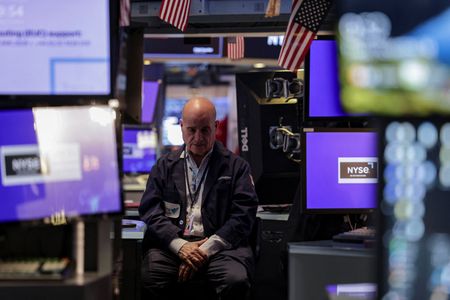By Stephen Culp
NEW YORK (Reuters) -U.S. stocks extended their selloff and benchmark Treasury yields inched lower as investors embarked on a week of accelerated economic data releases in the aftermath of the longest government shutdown ever in the United States.
Chipmaker Nvidia is due to report quarterly earnings on Wednesday. The artificial intelligence bellwether’s results will be scrutinized for signs of waning demand in a sector that has driven much of the stock market’s rally over recent months.
All three major U.S. stock indexes churned sharply lower as the session progressed.
“I think we’re seeing some follow-through on last week’s pullback, particularly in the tech sector focusing on the AI trade,” said Matthew Keator, managing partner in the Keator Group, a wealth management firm in Lenox, Massachusetts. “The question is do the valuations justify the stock price?”
“Behind that, there is some concern related to employment and how the AI trade is going to play out in terms of the jobs number in the future and what that looks like to the unemployment numbers,” Keator added.
Last week, lawmakers reached an agreement to end what had become the longest-ever U.S. government shutdown, during which an absence of official economic data helped dampen expectations that the U.S. Federal Reserve would implement its third rate cut of the year at the conclusion of next month’s policy meeting.
To make up for lost time, this week promises a slew of pent-up reports, including the Labor Department’s September employment data slated for Friday.
“There’s a great deal of uncertainty about what to expect from several months of data, and over the period of the next several weeks that’s going to be a big focus,” said Tim Ghriskey, senior portfolio strategist at Ingalls & Snyder in New York.
Third-quarter earnings season is winding down, with more than 90% of the companies in the S&P 500 having reported. Of those, 83% have delivered consensus-beating results, according to LSEG data. Aside from Nvidia’s hotly anticipated results on Wednesday, retailers Home Depot, Target and Walmart, among others, should shed light on the state of consumer demand.
The Dow Jones Industrial Average fell 557.24 points, or 1.18%, to 46,590.24, the S&P 500 fell 61.72 points, or 0.92%, to 6,672.39 and the Nasdaq Composite fell 192.51 points, or 0.84%, to 22,708.08.
European stocks slipped as market participants shied away from making big bets ahead of long-deferred U.S. jobs data.
MSCI’s gauge of stocks across the globe fell 7.98 points, or 0.80%, to 987.45.
The pan-European STOXX 600 index fell 0.54%, while Europe’s broad FTSEurofirst 300 index fell 12.66 points, or 0.55%
Emerging market stocks rose 0.93 points, or 0.07%, to 1,386.54. MSCI’s broadest index of Asia-Pacific shares outside Japan closed higher by 0.04%, to 714.13, while Japan’s Nikkei fell 52.62 points, or 0.10%, to 50,323.91.
Treasury yields dipped amid AI growth concerns, as traders evaluated whether the Fed will cut interest rates next month as delayed inflation and employment reports become available.
The yield on benchmark U.S. 10-year notes fell 1.3 basis points to 4.135%, from 4.148% late on Friday.
The 30-year bond yield fell 1.1 basis points to 4.7348% from 4.746% late on Friday.
The 2-year note yield, which typically moves in step with interest rate expectations for the Federal Reserve, fell 0.6 basis points to 3.608%, from 3.614% late on Friday.
The dollar firmed as the resumption of official U.S. economic data put currency traders on guard, particularly in the aftermath of some non-government data such as ADP’s National Employment index, which hinted at softening in the labor market.
The dollar index, which measures the greenback against a basket of currencies including the yen and the euro, rose 0.23% to 99.55, with the euro down 0.28% at $1.1588.
Against the Japanese yen, the dollar strengthened 0.44% to 155.21.
Bitcoin fell 1.53% to $92,008.68. The cryptocurrency has erased its year-to-date gain, touching its lowest level since late April. Ethereum declined 1.66% to $3,021.44.
Crude prices dipped after plunging about 4% in the previous session, as investors weighed worries of oversupply with looming sanctions against Russia’s Lukoil.
U.S. crude fell 0.3% to settle at $59.91 per barrel, while Brent settled at $64.20 per barrel, down 0.3% on the day.
Gold inched lower in opposition to the firming greenback. Spot gold fell 0.9% to $4,042.39 an ounce. U.S. gold futures fell 1.67% to $4,019.40 an ounce.
(Reporting by Stephen Culp; Additional reporting by Lawrence White in London and Tom Westbrook in Singapore, Editing by William Maclean and Will Dunham)












